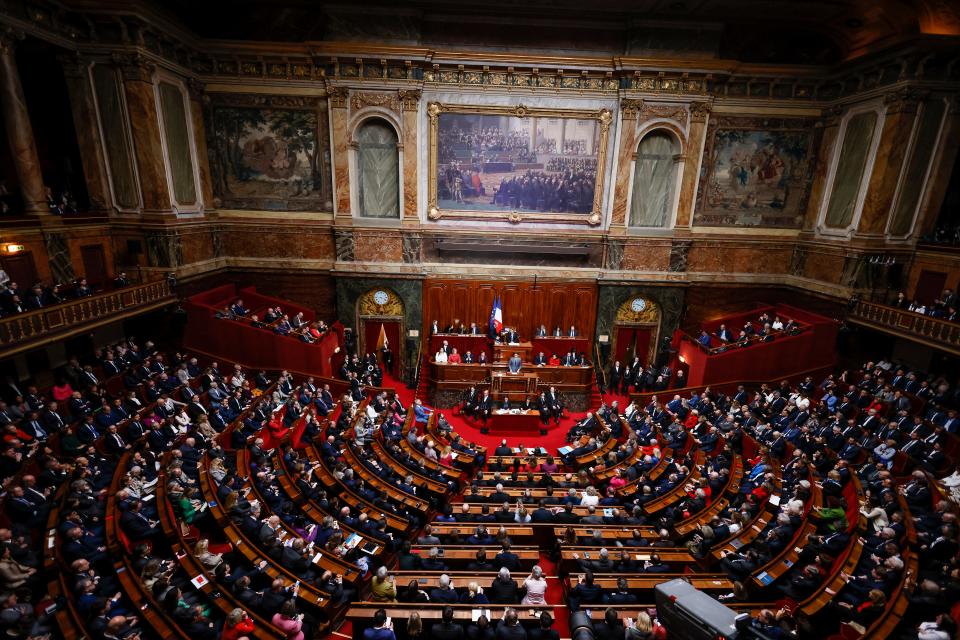France becomes only country to enshrine the right to abortion in its constitution
France made history on Monday as the first country in the world to enshrine the right to abortion in its constitution.
In a special session held at the Palace of Versailles, parliament passed the bill, which had already been adopted by the National Assembly in January and the Senate on Wednesday, with an overwhelming vote of 780-72. Parliament had to put a final stamp of approval at the joint session on Monday for it to officially go into effect, reported AP.
The amendment to Article 34 of the French Constitution states that “the law determines the conditions by which is exercised the freedom of women to have recourse to an abortion, which is guaranteed.” Abortion has been legal in France since 1975 and is overwhelmingly supported by the French population, according to polls.
Recently, President Emmanuel Macron promised French citizens that he would work to make the right to abortion "irreversible" following the rollback of abortion rights in the U.S.
France is the only country to currently have such a specification in their constitution, though former Yugoslavia enshrined the right into its constitution in 1974, a sentiment that carried over into modern-day Serbia in less specific terms as the right to "decide on childbirth.” This amendment to the French constitution is one of only 17 made since the constitution was adopted in 1958 and the first since 2008.

According to AP and The Guardian, Prime Minister Gabriel Attal told parliament that they "have a moral debt to women" in an appeal before the vote on Monday, saying in part, “We are haunted by the suffering and memory of so many women who were not free. We owe a moral debt [to all the women who] suffered in their flesh."
“Today, the present must respond to history," he continued, reported AP and The Guardian. "To enshrine this right in our constitution is to close the door on the tragedy of the past and its trail of suffering and pain. It will further prevent reactionaries from attacking women."
The right to abortion has not faced significant challenges by modern French parties, including conservatives and the far-right National Rally party. While some have voted against making abortion a constitutional right in the past, the attitudes of the major political parties generally align with that of the French public, of which a recent poll found more than 80% support the right to abortion, according to AP.
Reactions to the French abortion bill
U.S. abortion restrictions: Wyoming legislature approves chemical and surgical abortion restrictions

Applause and celebration broke out in parliament following the successful vote, with lawmakers caught on camera standing to clap in the chambers.
Photos and videos outside the palace also showed crowds stationed outside with signs, hugging each other, cheering, clapping and setting off celebratory glitter launchers as the final approval was announced. According to AP and The Guardian, cheers and celebration could be heard both in and outside the palace.
Anti-abortion protestors also made an appearance outside the Palace of Versailles in response to the bill, likewise sporting signs. Marine Le Pen, leader of the far-right National Rally, told outlets including Reuters the move was unnecessary and a ploy for political points, though she also said her party would not vote against it.
Other anti-abortion organizations like the Association of Catholic Families criticized the move, calling it a "defeat" to women and children, according to Reuters.
Pharamcies to stock abortion meds: CVS and Walgreens to begin carrying abortion pill mifepristone within weeks

What does 'enshrine' mean?
The word "enshrine" is often used when referring to amendments and constitutions, such as in the case of France enshrining the right to abortion in its constitution. Why say "enshrine" when you could simply say something like "written into" or "included in?" The connotation of the word is slightly heftier than simply "to put in."
According to Merriam-Webster and the Cambridge Dictionary, to enshrine something is to containor preserve it in a place or way that is highly admired, protected and respected.
If a political or social right is "enshrined in something" it is protected by being included in that thing. For example, the right to vote for women is present in the United States Constitution in the form of the 19th Amendment, meaning women's right to the vote is protected, regarded and respected because it is enshrined in, or is part of, the constitution.
In this way, enshrine means more than to place something inside of something else. It carries the connotation of respect and importance.
Abortion rights post overturning of Roe v. Wade
French lawmakers cited the 2022 overturning of Roe v. Wade in the U.S. as part of the inspiration behind its most recent abortion bill, saying in part: "Unfortunately, this event is not isolated: in many countries, even in Europe, there are currents of opinion that seek to hinder at any cost the freedom of women to terminate their pregnancy if they wish,” reported AP.
French activists and politicians have expressed concerns over abortion rights since the Dobbs decision made by the U.S. Supreme Court in 2022, stripping Americans of abortion rights after 50 years of constitutional protection.
Other European countries are also weighing expanding access, including the few very small countries that do not currently allow or heavily restrict abortion, like Poland. Abortion is currently accessible in more than 40 European nations.
In the time following the U.S. Supreme Court's decision, dozens of states across the country have banned or attempted to ban abortion. Before the decision was overturned, people in almost every state were allowed to undergo an abortion until around 24 weeks into a pregnancy, which was typical practice determined by the Supreme Court in the 1992 decision Planned Parenthood v. Casey.
Now, abortion laws vary from state to state, with many high-profile cases of ongoing bills, legal battles, and deaths punctuating the battleground that has been reproductive rights.
Recently, an Alabama law that determined frozen embryos to be "extrauterine children" raised alarms amongst IVF patients and providers; in December, the plight of an Ohio woman who suffered a miscarriage became national news when the state charged her with felony abuse of corpse.
This article originally appeared on USA TODAY: France enshrines abortion as constitutional right

